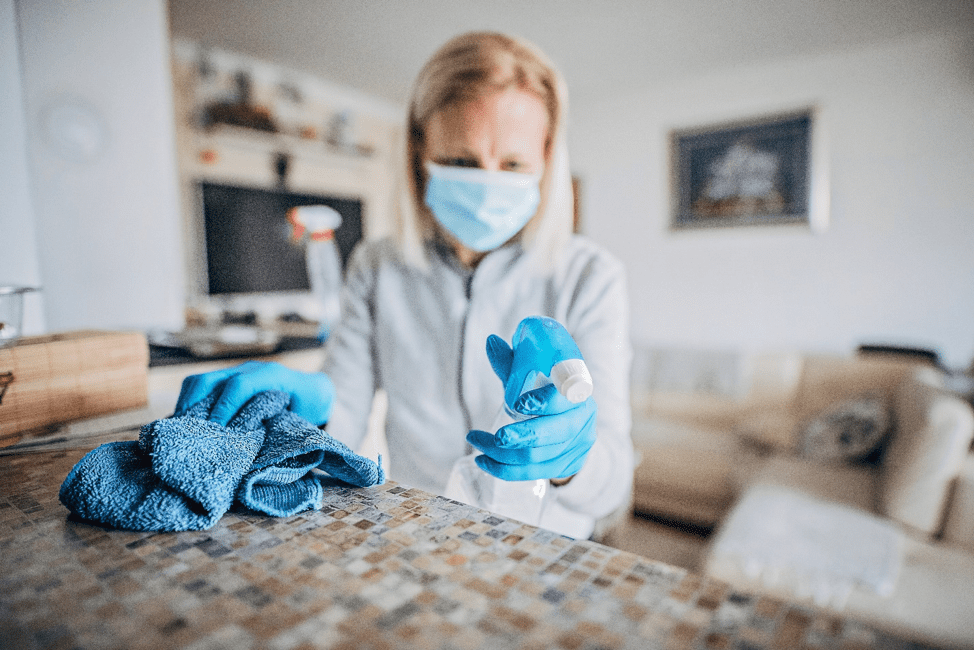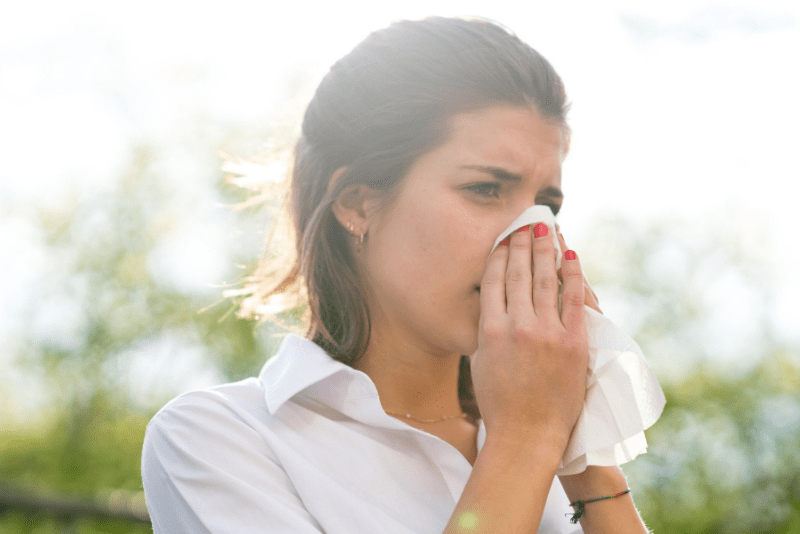Recently, we have all become part of a whole new world brought on by the COVID-19 virus. As we are isolated and quarantined to our homes to reduce exposure, we are finding ourselves cleaning…and cleaning out…and cleaning some more! A spring cleaning would seem like a great way to occupy our time and help our family’s underlying allergies and asthma; however, many of us have allergies and asthma, which can frequently be triggered by indoor household exposure. Not to worry, you can still give your space a good cleaning, just be careful with your choice of cleaning products. Our goal is to keep you safe and healthy!
Dr. Harper once had a patient who was hospitalized because they were cleaning floor tiles with diluted bleach. Unbeknownst to the patient, her supervisor had sprayed ammonia ahead of her cleaning efforts. The mixture of diluted bleach and ammonia produced chlorine gas, which was used as chemical warfare in WWI.
Certain household cleaning products that are readily available can trigger significant respiratory problems, even in individuals without prior lung disease. A recent study in the American Review of Respiratory and Critical Care Medicine indicates that women who are employed as household cleaners have an accelerated loss of lung function, particularly if they are using spray cleaners.
Allergy sufferers should make household chores part of their allergy management plan. Cleaning reduces the number of allergens in homes which can ultimately help alleviate your allergy and asthma symptoms. Indoor allergen avoidance would include reducing dust-collecting clutter, regularly vacuuming with a HEPA filter vacuum, regularly washing blankets and throw rugs, washing all bed linens in hot water once a week, keeping counter surfaces clean and dry, and not leaving food out.
Individuals who have asthma have increased airway twitchiness which can be triggered by irritant and noxious odors including cigarette smoke, chlorine, fragrances and ammonia. If one has asthma or allergies, care should be taken to choose cleaning products which are milder and do not trigger worsening of your symptoms.
Certain potent cleaning products can be mucosal irritants and can cause a worsening of respiratory symptoms in patients with allergies and asthma. The best way to avoid irritation from cleaning products is to have someone else in the household do the cleaning when the allergy sufferer is away from home. This could be a perfect time for your spouse to clean while you enjoy a walk!
There are particular home cleaning products which should be avoided by individuals with allergies and asthma. These products include formaldehyde, ammonia, sodium lauryl sulfate, D-limonene and sodium hypochlorite (bleach). Unfortunately, these chemicals can be found in a wide variety of available cleaning products including furniture polish, disinfectants, mold removers, dish detergents, hand soaps, laundry detergents, fabric softeners, all-purpose cleaners and drain/oven/grill cleaners. “Green” cleaning products can be milder and better for those with allergies, but labels should be read carefully. Interestingly, simple baking soda and vinegar in varying concentrations can clean just about anything in your home!
The best cleaning tools for allergen reduction include a vacuum cleaner, particularly with a double bag system or HEPA filter system. Additionally, a fabric allergen sanitizer vacuum can eliminate 99.9% of dust mites and bacteria from fabric surfaces. Washable microfiber cleaning cloths are safe and effective. Likewise, disposable dust wipes, protective mask and gloves and unscented and dye-free laundry products are safe and work well.
There are many, many cleaning products advertised on the internet, although the safety and effectiveness of these products can be questionable. How do you choose a safe cleaning product? The Allergy and Asthma Foundation of America (AAFA) has developed a certification program to document specific advertised products as being safe from false, exaggerated, or misleading claims. These products can be found on the AAFA website.
If one is inclined to be a “do-it-yourselfer,” safe gentle homemade cleaners can be prepared without an advance chemical degree or access to industrial-strength petrochemicals. The following is a list of a safe products which can be easily prepared.
- All-purpose cleaner: Mix 2 cups of vinegar and 2 cups of water to create an all-purpose cleaner and disinfectant. Do not use this cleaner on marble. It can be used on both kitchen and bathroom surfaces.
- Scouring cleaner: Mix ¾ cup of baking soda and ¼ cup of water to create a paste for cleaning sinks, tubs, toilet, ceramic, aluminum, chrome, and stainless steel. This same paste can be used to polish silverware. Alternatively, mix ¼ cup of baking soda, 1 tablespoon of liquid detergent and enough white vinegar to make a creamy texture. You can also add a squeeze of lemon into the paste for a fresh and clean smell.
- Drain cleaner: Pour ¼ cup of baking soda in one cup of vinegar down drains. The combination of the two will create a fizzy cleaner that will scour inside of your drain pipes. Rinse with hot water.
- Dishwasher cleaner: Pour ½ cup of vinegar into the reservoir of your dishwasher and run an empty cycle to disinfect and cleaning the interior of your dishwasher.
- Mold and mildew cleaner: Spray vinegar on shower walls and curtains to clean and prevent mold and mildew. Wait 15 minutes, rinse and let dry thoroughly.
- Window cleaner: Mix together one cup of water, one cup of rubbing alcohol and 1 tablespoon of vinegar. This cleanser works great at cleaning glass without leaving streaks or residue.
- Garbage disposal cleaner: Grind peels from oranges, lemons and limes in the garbage disposal with a handful of ice. The ice will sharpen the disposal blades while the citrus peels cleans and freshen the air.
So, while we’re all at home right now twiddling our thumbs for the next clean out project, make sure you are using the best cleaning product for your allergy and asthma needs. If you can’t find what you need, hopefully this list of DIY cleaners is helpful. But if you have suspected or confirmed COVID-19, please see the CDC’s cleaning instructions.




